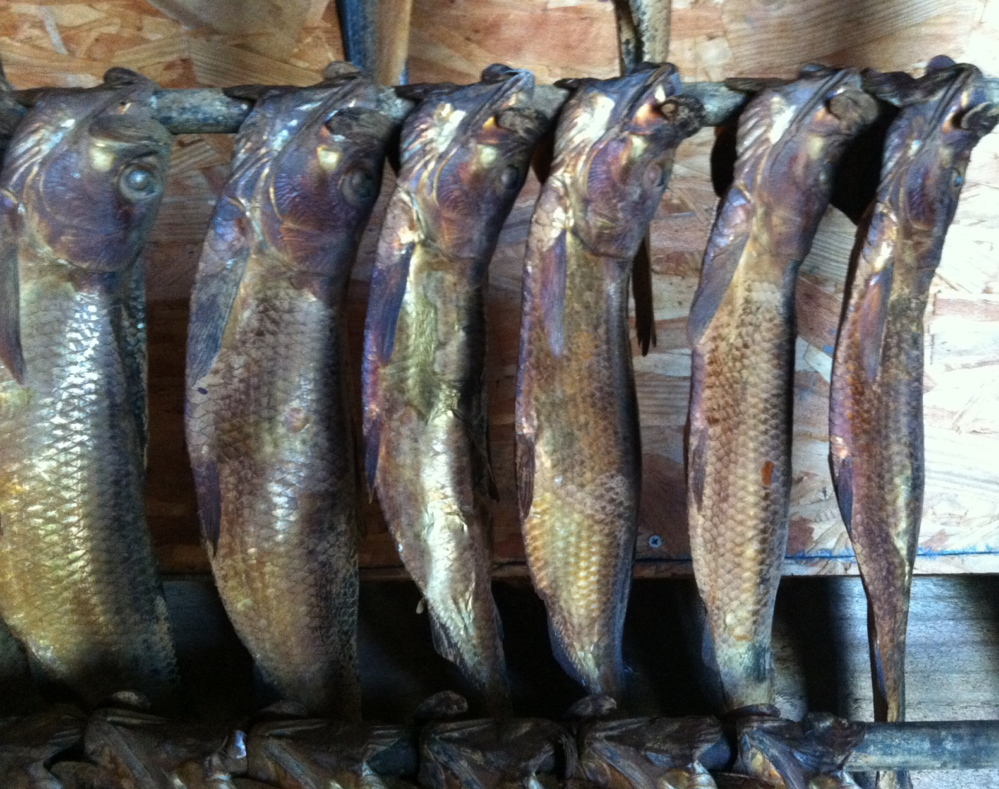Before I came to Maine, I knew alewives, or rather Alewife, as a subway station in Boston (end of the red line, edge of Cambridge). But I had never heard of the fish, much less eaten one. Last weekend, I remedied that – and a delicious education it was. Driving home from Camden, I passed several hand-painted signs advertising “fresh smoked alewife.” The signs operated on me much as the alewives apparently operate on lobster: I took the bait. A friend and I walked up a long driveway, helped ourselves, as the sign instructed, to two alewives hanging on racks in a small, bare shack. At a buck apiece, this was the least I’ve spent on fish in a very long time.
Many in Maine are working to restore these river herring (relatives of shad) to their historic habitats by removing dams, installing fish passages and otherwise stewarding the fish as they head upriver to spawn each May, in the Kennebec, the Penobscot and elsewhere. Alewife numbers plummeted in the mid-1980s; blame centuries of dams and pollution. “We saw populations just totally crash,” said marine scientist Claire Enterline, who is the municipal river herring harvest coordinator for the Maine Department of Marine Resources. In the last five to 15 years, the population has gradually increased, though it’s not at historic levels by any means.
As recently as 50 years ago, the alewife runs provided a good food source for Mainers at the end of long, lean winters. These days we go to the supermarket when our cupboards are bare, but other winter-weary animals – bass and brown trout, eagles, osprey and herons – still rely on the alewife runs. As spring arrives, Enterline said, these species “are at the end of their rope.” The alewives also help restore river water quality, she said. She encouraged Mainers to try the fish in part because, “It’s a nice connection to the annual migration cycles. It keeps you connected to the natural rhythms. We still can see them, and we still can partake.”
Old-timers add smoked alewife to chowder, which sounds wonderful. Enterline combines it with goat or cream cheese to make a dip. I “partook” by adding the fish to risotto with other items that happened to be in my kitchen – corn, chives and baby arugula. Serendipity and pure pleasure.
The smoked fish will perfume your car as you drive home and your kitchen once you get there. Like blue cheese, it’s strong stuff; friends who arrived as I was cooking mistook the smell for bacon. Chunks of smoked alewife permeated the rice with a similar meaty, smoky umami quality – all the flavors that hipster foodies go on and on about. It mystifies me that people snub these fish.
— PEGGY GRODINSKY
Send questions/comments to the editors.



Success. Please wait for the page to reload. If the page does not reload within 5 seconds, please refresh the page.
Enter your email and password to access comments.
Hi, to comment on stories you must . This profile is in addition to your subscription and website login.
Already have a commenting profile? .
Invalid username/password.
Please check your email to confirm and complete your registration.
Only subscribers are eligible to post comments. Please subscribe or login first for digital access. Here’s why.
Use the form below to reset your password. When you've submitted your account email, we will send an email with a reset code.